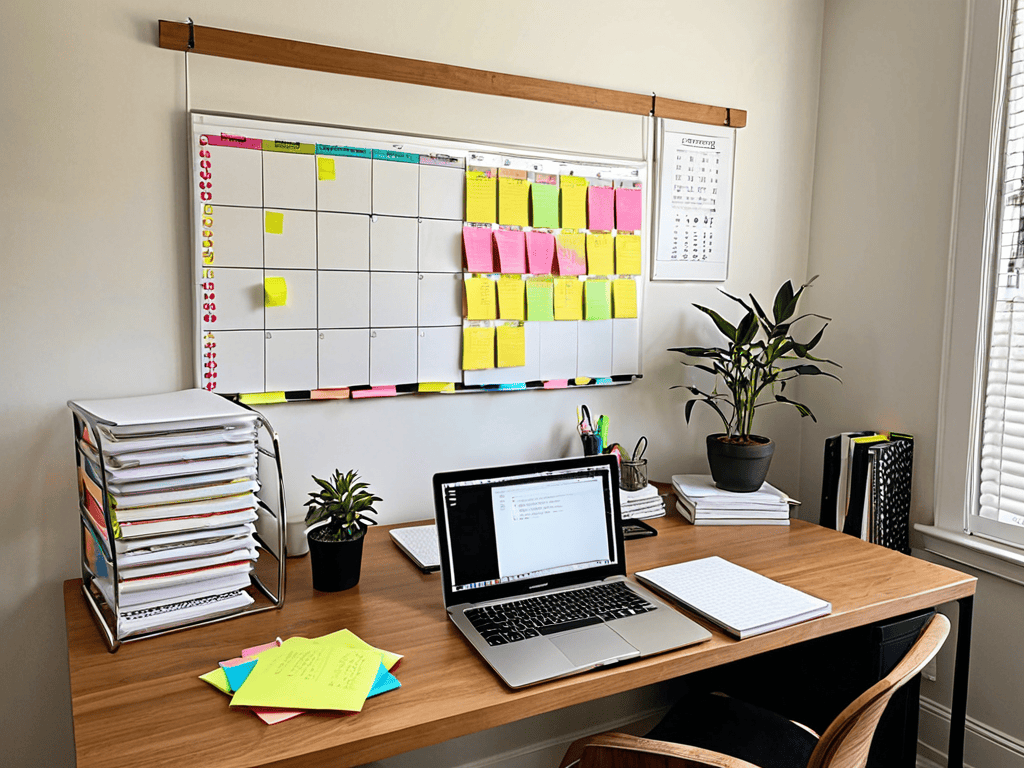I still remember the day I ditched my 9-to-5 job to become a full-time freelancer – it was exhilarating, but also terrifying. I had no idea how to manage my finances as a full-time freelancer, and the uncertainty was overwhelming. The common myth that freelancers can just “wing it” with their finances and still succeed is not only misleading, but also damaging. In reality, managing your finances as a freelancer requires discipline, patience, and a solid plan.
As you navigate the world of freelancing, you’ll quickly realize that financial stability is key to your success. In this article, I’ll share my personal story and provide you with practical advice on how to manage your finances as a full-time freelancer. You’ll learn how to create a budget that works for you, how to track your expenses, and how to make informed decisions about your financial future. My goal is to give you the tools and confidence you need to take control of your finances and focus on what really matters – your craft.
Table of Contents
Guide Overview: What You'll Need

Total Time: several hours over several days
Estimated Cost: $0 – $100
Difficulty Level: Intermediate
Tools Required
- Spreadsheets software (e.g., Google Sheets, Microsoft Excel)
- Budgeting app (optional)
- Calculator
Supplies & Materials
- Paper and pen for note-taking
- Folder for organizing financial documents 12 inches wide to hold papers and receipts
- Shredder for secure document disposal capable of handling 6 inches of paper at a time
Step-by-Step Instructions
- 1. First, set financial goals that align with your freelance lifestyle, considering both short-term needs and long-term aspirations, such as saving for retirement or paying off debt; this will help you stay focused on what you want to achieve and give you a sense of direction when making financial decisions.
- 2. Next, track your income and expenses to understand where your money is coming from and where it’s going; this can be done using a spreadsheet, an accounting software, or even a mobile app, and it’s essential to include every single transaction, no matter how small, to get an accurate picture of your financial situation.
- 3. Then, create a budget that works for you, taking into account your variable income, fixed expenses, and financial goals; this budget should be flexible enough to accommodate the ups and downs of freelance work, and it should also include a cushion for unexpected expenses or slow months.
- 4. After that, prioritize needs over wants, making sure to cover essential expenses such as rent, utilities, and insurance before spending on discretionary items; this will help you maintain a healthy financial balance and avoid debt, and it’s also important to review and adjust your priorities regularly to ensure they still align with your goals.
- 5. Fifth, manage your taxes effectively, considering the unique challenges and opportunities that come with freelance work; this may involve setting aside a portion of your income for taxes, taking advantage of deductions and credits, and seeking professional help when needed to ensure you’re in compliance with tax laws and regulations.
- 6. Next, build an emergency fund to protect yourself against financial shocks, such as a sudden loss of clients or a medical emergency; this fund should cover at least three to six months of living expenses and be easily accessible, providing a safety net that allows you to weather any storms and stay focused on your long-term goals.
- 7. Finally, review and adjust your financial plan regularly, taking into account changes in your income, expenses, and goals; this will help you stay on track, make informed decisions, and ensure that your financial strategy remains aligned with your freelance lifestyle and aspirations, and it’s also an opportunity to celebrate your successes and learn from your mistakes.
Mastering Freelance Finance

To truly master freelance finance, it’s essential to stay organized and on top of your expenses. One way to achieve this is by utilizing freelance accounting software, which can help streamline your invoicing and expense tracking processes. By having a clear picture of your financial situation, you can make informed decisions about your business and avoid costly mistakes.
Effective invoicing tips for freelancers can also make a significant difference in managing your cash flow. This includes setting clear payment terms, sending invoices promptly, and following up with clients in a professional manner. Additionally, taking advantage of tax deductions for home office can help reduce your taxable income and increase your overall earnings.
As a freelancer, managing cash flow can be a challenge due to irregular income. To mitigate this, it’s crucial to prioritize budgeting for irregular income and create a financial safety net. By doing so, you can ensure that you’re always prepared for slow periods or unexpected expenses, and maintain a stable financial foundation for your business.
Freedom Through Freelance Accounting Software
Freedom Through Freelance Accounting Software
Investing in the right accounting software can be a game-changer for freelancers. It simplifies invoicing, expense tracking, and tax preparation, saving time and reducing stress. With cloud-based options like QuickBooks or Xero, you can access your financial data from anywhere, making it easier to stay on top of your finances. These tools also often include features like automated expense categorization and invoicing reminders, helping you stay organized and focused on your work. By leveraging freelance accounting software, you can streamline your financial management and gain more freedom to pursue the projects and clients that matter most to you.
Invoicing Tips for Stressless Cash Flow
To keep your cash flow on track, invoicing needs to be a priority. This means setting clear terms, such as payment due dates and late fees, to avoid confusion and delays. Consider using invoicing templates or software that automates reminders and follow-ups, saving you time and reducing stress.
Regularly reviewing and adjusting your invoicing process can also help identify potential issues before they become major problems, ensuring a smoother financial journey as a freelancer.
Staying Financially Afloat: 5 Essential Tips for Full-Time Freelancers
- Set clear financial goals and prioritize needs over wants to maintain a stable cash flow
- Implement a reliable invoicing system and consider offering flexible payment terms to clients
- Develop a robust accounting system, either manually or through software, to track expenses and income
- Create a cushion for slow months by saving a portion of your income in a dedicated emergency fund
- Regularly review and adjust your tax strategy to minimize liabilities and maximize deductions as a freelancer
Key Takeaways for Freelance Financial Mastery
Implementing a personalized budget and tracking expenses is crucial for maintaining financial stability as a freelancer
Leveraging freelance accounting software can significantly streamline financial management and reduce administrative burdens
Effective invoicing strategies, including clear communication and timely follow-ups, are essential for ensuring a stressless cash flow and long-term financial success
Financial Freedom Defined
Mastering your finances as a freelancer isn’t about spreadsheets and invoices – it’s about crafting a life where your passion and profits are in perfect harmony.
AmandaWrites
Mastering the Freelance Financial Journey

As you continue on your journey to mastering the art of freelance finance, it’s essential to stay organized and informed. One of the most significant challenges freelancers face is navigating the complex world of taxes and invoicing, which is why having the right tools and resources at your disposal is crucial. For instance, utilizing a reliable accounting software can make a significant difference in streamlining your finances, and staying on top of your cash flow. If you’re looking for additional guidance or want to explore more options for managing your finances, you might find some valuable insights at vielles cochone, a resource that offers a unique perspective on financial management and planning, helping you to make more informed decisions and achieve a better work-life balance.
As we’ve navigated the world of freelance finance together, it’s clear that taking control of your finances is crucial for success. From setting up a budget that works for you to leveraging freelance accounting software for streamlined operations, and implementing effective invoicing tips for a stressless cash flow, each step builds upon the last to create a robust financial foundation. By mastering these elements, freelancers can ensure a stable and profitable career, free from the financial stresses that often accompany this lifestyle.
In the end, freelancing is about more than just financial stability – it’s about freedom and the ability to pursue projects that truly resonate with you. So, as you embark on or continue your freelance journey, remember that financial discipline is not a restriction, but a key that unlocks the door to a life of professional and personal fulfillment, where your passion and creativity can thrive without the weight of financial uncertainty.
Frequently Asked Questions
How do I separate my personal and business expenses to avoid tax headaches?
Separate your personal and business expenses by using a dedicated business bank account and credit card. This will make it easier to track and categorize expenses, saving you from tax headaches down the line. Consider using accounting software to label and organize your expenses, keeping personal and business transactions strictly apart.
What are some common financial pitfalls that full-time freelancers should watch out for?
Watch out for feast-or-famine income swings, inadequate savings, and scope creep that can blow your budgets. Also, be mindful of unpaid invoices and tax season surprises that can catch you off guard.
How can I create a stable financial safety net when my income is unpredictable from month to month?
To create a stable financial safety net, prioritize building an emergency fund that covers 3-6 months of living expenses. Set a fixed amount aside each month, regardless of your income, and consider using a separate savings account to keep it separate from your everyday funds.
